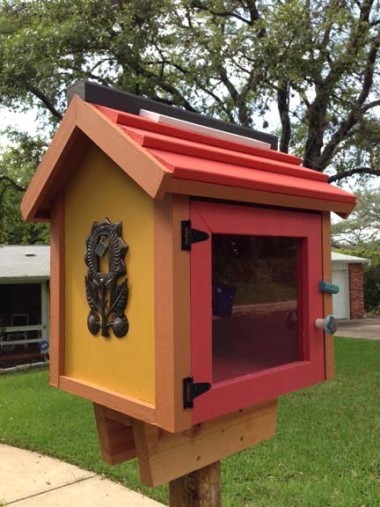Tiny libraries
The Little Free Library Book: Take a Book, Return a Book by Margret Aldrich Minneapolis, MN: Coffee House Press, $25.00 hardcover (264 pages), April 2015.
Guest Review by Lanie Tankard
How far that little candle throws his beams;
So shines a good deed in a naughty world.
—William Shakespeare (Portia in The Merchant of Venice, Act V, Scene i)
Margret Aldrich loves books, and she loves to share them—so much so that she wrote a book about it: The Little Free Library Book: Take a Book, Return a Book. This volume tells the inspiring tale of a growing movement to unite people through the sharing of books in neighborhoods. The motto: “Always a gift. Never for Sale.”
The Little Free Library (LFL) concept was the brainchild of Todd Bol of Hudson, Wisconsin, who explained in a 2013 TED Talk how he and cofounder Rick Brooks began this program in 2009. Editor/writer Margaret Aldrich was taken by the idea, so she “planted” her own LFL in front of her Minneapolis home.
Aldrich’s new book probes the how and why of this program, with chapters about community building, literacy, creativity, overcoming challenges, the humanitarian “good deed” characteristics, global reach, and even yarn bombing—with a Foreword written by Bol. Aldrich enlarges these basic concepts with headings such as “Come Together,” “Celebrate Reading,” “Kickstart Creativity,” and “Pay It Forward.” She includes interviews with a selection of LFL stewards.
NooX, an ongoing study begun in 2012 by Canadian researchers, examines how neighborhood book exchanges relate to theories of information practices. Investigators identified four main goals in 2014—neighborhood destinations, interactive spaces, gathering spaces, and sharing books—emphasizing the wide divergence in these goals from steward to steward.
LFLs encourage the green reuse of materials for building, which preserves the environment while it also enhances the edginess of styles. The artistic aspect of these tiny book havens shines forth on practically every page of Aldrich’s book, in photos of all the different ways stewards around the world have presented their creations. The designs swing far and wide: a Victorian haunted house in Iowa City, a hollow ash tree in Canada, a deconstructed pinball machine in the Netherlands, a library made of buttons, a small VW bus, and a blue police box resembling the time-traveling TARDIS from Doctor Who. Stewards tweak these miniature houses and their literary contents much as bonsai addicts do their wee trees.
Want to build your own? Construction plans are included here as well, with tips for builders and installation guides. Whether you purchase a ready-made structure from the Little Free Library website or start from scratch, the next step is to register the finished book dwelling on the LFL world map to make it official.
I’ve wanted one for a long time. My childhood passion for books called me to this task. I was intrigued by the idea of releasing books into the wild to let them fly. A website called Bookcrossing actually provides a way to track book travels, should you want to spend the time to label and post your volumes online—which of course requires the finder to record the “catch” as well.
[Lanie Tankard’s Tiny Library at her home.]
Yesterday, I launched my own official Little Free Library. Last September, I had downloaded building instructions from the LFL website. In October, a craftsman working on my house set a post in concrete near the curb in my front yard, after I’d checked with city water and electric workers about placement. I tacked a wooden sign to the post: “Future Site of a Little Free Library.” Then I gave the plans to the craftsman, who promised to build me one by the end of the year. Good intentions fell by the wayside though, as he got busy with other jobs.In late December, I noticed a special promotion on the Little Free Library website for the prebuilt Cedar Roof Basic design—complete with free shipping, a big red bow, and stuffed full of free books from Coffee House Press. Who could resist?
When the unpainted LFL arrived, I noticed the name of the carpenter: Henry Miller in Cashton, Wisconsin. Miller is a talented Amish woodworker at H&L Rustic Reclaim who has built hundreds of LFLs. Thanks, Henry! Nice work!
Next came the painting—once the weather finally warmed up and it wasn’t raining. Since I was going for a folk-art theme, I used seven colors, with three coats of each (two over a primer). I admit, there were days when I thought I’d never finish. I found a colorful knob. I repurposed several metal items for decorations on the sides.
And suddenly, my LFL was ready. The craftsman even came by to install it for free, as a goodwill gesture. We chatted about what he liked to read, and he selected a book of poems, The Architecture of Language by Quincy Troupe, from the library. A Miles Davis fan, he said he remembered reading Troupe’s memoir Miles and Me and enjoying it.
[Margret Aldrich, author.]
In Margret Aldrich’s book, former US poet laureate Billy Collins notes Little Free Libraries are “a terrific example of placing books—poetry included—within reach of people in the course of their everyday lives.”Coming unexpectedly upon one of these wee book buffets laden with stories is akin to a parched traveler stumbling onto an oasis, lifting one’s spirits like a daub of color on a gray day. Aldrich’s book lovingly documents the role of Little Free Libraries in building communities as we reach out and meet one another.
Did you think LFLs were only about books? Oh my, books are just the tip of the iceberg.
Brava, Margret Aldrich!
Lanie Tankard is a freelance writer and editor in Austin, Texas. A member of the National Book Critics Circle and former production editor of Contemporary Psychology: A Journal of Reviews, she has also been an editorial writer for the Florida Times-Union in Jacksonville.
The post Tiny libraries appeared first on Richard Gilbert.







